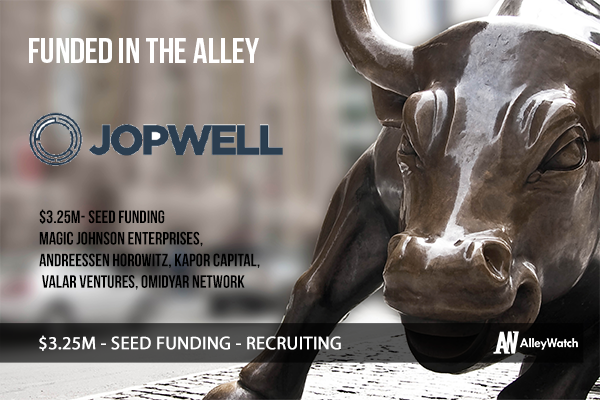Starting a career can be tough, and with most internships requiring that you have at least a year of experience, getting that first year can seem impossible. Jopwell, understanding that companies have certain quotas of hiring certain ethnic groups jumped on this opportunity to provide a resource for Black, Latino/Hispanic, and Native American professionals and students to get in contact with companies to help them fix their own pipeline problem. With powerful companies such as Facebook, Jet, Morgan Stanley and many more using Jopwell, they are doing a service for both a social cause as well as an economic need.
CEO Porter Braswell chatted with AlleyWatch about Jopwell and about their recent round of funding to help build the young company.
Who were your investors and how much did you raise?
We recently raised $3.25 million in seed funding from Magic Johnson Enterprises, Andreessen Horowitz, Kapor Capital, Valar Ventures, and Omidyar Network, among others. Prior to the seed round, we raised just over $1 million in angel investment from Y Combinator and Rothenberg Ventures. So, more than $4.22 million overall.
Tell us about your product or service.
Jopwell helps today’s leading companies find and recruit Black, Latino/Hispanic, and Native American professionals and students at scale. The platform provides two-way empowerment for both companies and job seekers, delivering a pipeline of talent to fill a range of roles – from experienced to entry-level to internships – across industries, including technology, finance, education, not-for-profits, consulting, and healthcare. In doing so, Jopwell shrinks the diversity employment gap and helps underrepresented ethnic minority talent find jobs they love.
What inspired you to start the company?
We met as analysts on the same Wall Street trading floor and quickly became friends. Both of our careers in finance had started early, thanks to established diversity programs; Porter interned at an investment bank beginning in high school, and Ryan did the same in college.
We realized that these programs had provided us a unique opportunity to lay an early foundation for successful careers.
But we also understood that the majority of other ambitious underrepresented ethnic minorities didn’t have access to similar opportunities throughout their careers. So in the summer of 2014, we started Jopwell to help others achieve career success through increased opportunity.
How is it different?
We are the only platform today using technology to build direct relationships at scale between underrepresented Black, Latino/Hispanic and Native American professionals and the nation’s most desirable places to work.
What markets are you targeting and how big is it?
Right now, we’re focused on connecting Black, Latino/Hispanic, and Native American candidates with our partner companies. As we continue to grow and scale up, we look forward to serving even more minority candidates and audiences.
What’s your business model?
Our business model is pretty simple. Companies pay us an annual fee to use our platform, which gives them a pipeline of highly qualified minority candidates that they can then connect and converse with, all with the goal of providing career opportunity. Job seekers never have to pay a fee to use our service.
Can you expound more on the “pipeline problem” in our workforce?
The pipeline problem is real and growing. For most industries and companies, there’s a lack of resources for diversity-driven recruitment. Most of them also inadequately market available positions to minority job seekers.
You see, employers have typically relied on existing minority employees to informally tap into their networks and drive potential candidates. That’s how they’ve tried to find diverse talent to fill positions. It’s an ad hoc and ineffective method that doesn’t scale. This has created a limited pipeline of talent, which we built Jopwell to solve.
What was the funding process like?
The investors we met with understood the problem. This is an issue that isn’t going away and can impact bottom line value for companies. We need technology to make things better, which is why the level of interest in Jopwell has been so high.
What are the biggest challenges that you faced while raising capital?
The biggest challenge we faced when raising capital was still keeping focus on building our business. We wanted to open and close a round very quickly so that we could get back to building.
What factors about your business led your investors to write the check?
Ultimately, our investors signed off because they fundamentally believe in Jopwell’s mission, which is two-fold: shrink the diversity employment gap that keeps organizations from being more successful, and help underrepresented ethnic minority talent find jobs that they love.
What are the milestones you plan to achieve in the next six months?
Over the next six months, we are going to continue to work towards growing our user base and partnering with additional companies that are committed to diversity.
What advice can you offer companies in New York that do not have a fresh injection of capital in the bank?
When we first decided that we were going to start Jopwell, we didn’t have any investors or partners. But we started talking about our idea and fleshing it out with friends and colleagues, and slowly but surely, we started drawing interest and encouragement. We were fortunate to have some great relationships, but you have to be fearless enough to follow your passion and your vision, even when others tell you “no.” If you look in the right places, money can always be found; but passion is the true driver of success, and that can only come from within.
Where do you see the company going now over the near term?
In the immediate-term, we are going to continue to innovate our platform to make it the ultimate destination for employers interested in recruiting and hiring Black, Latino/Hispanic and Native American minority candidates.
What’s your favorite restaurant in the city?
Hundred Acres




